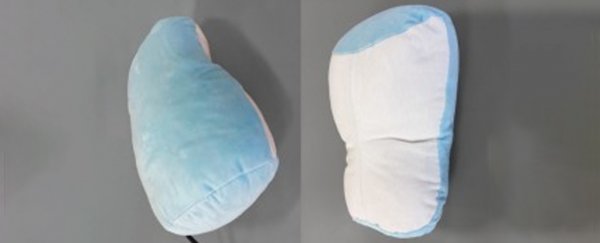After throwing 129 volunteers into the stressful situation of a sudden group math test, researchers found that people using a huggable 'breathing' cushion were more relaxed in the lead up to the questions than those without one.
"We were excited to find that holding the breathing cushion, without any guidance, produced a similar effect on anxiety in students as a meditation practice," engineer Alice Haynes from the University of Bristol and colleagues say in a statement.
After all the unusual stresses we've experienced over the last few years, many of us are understandably jitterier than ever. From losing loved ones, to the enforced isolation of lockdowns, the conditions we've been facing exacerbate or create new anxieties.
Rates of anxiety were already increasing before the pandemic; researchers estimate the global situation added almost an extra 80 million new cases of anxiety disorders (an increase of over 25 percent) in 2020 alone.
For some, traditional methods like meditation do not seem to help (for example, focusing on breathing can make one feel like they can't breathe). Therapy can be prohibitively expensive, while reliance on drugs can come with many problematic side-effects, including weight gain, fatigue, dizziness and insomnia, and for some people medications never even work.
So, researchers are constantly looking for new techniques that could help those of us struggling to find our way back to the land of calm – from new musical therapies, to Hayne and team's latest device.
The 36 centimeter (14 inch) cushion with an inflatable pocket connecting to an external pump and motor, was designed to encourage slow, deep diaphragmatic breathing, associated with easing anxiety, through its shape and rate of movement.
 (Haynes et al, PLOS One, 2022)
(Haynes et al, PLOS One, 2022)
The volunteers took part in anxiety-gauging questionnaires before and after being told about the math test. In-between the two questionnaires, around a third of participants hugged the cushion, another third participated in guided meditation, and the final third had no task as the control group.
The cushion huggers' and meditation group's second questionnaires suggested they were far less anxious than the control.
The researchers initially tested five prototype cushions – including one with a heartbeat and another that purred – and a focus group found the breathing one most soothing.
This device could prove perfect for acute anxiety situations like in the lead up to exams or for vulnerable people who struggle with everyday activities, like those with dementia. A preliminary trial with three dementia patients has shown promise – with all three participants wanting to take the 'breathing' cushion home with them.
Hayne and colleagues do not yet know which aspect of the huggable device is responsible for reducing anxiety. It could be that the breathing rate helps users optimize their own breaths, the act of hugging itself, or a combination.
Hugging is a known stress reliever – even an inanimate human-sized pillow can reduce levels of the stress hormone cortisol. As this pillow mimics human breathing, it may possibly also work towards mitigating feelings of loneliness, another well known anxiety-inducing stressor.
Next, the researchers hope to develop a cordless version of the device, to further investigate its physiological impacts in a natural home environment.
"The experiment demonstrated that holding the breathing cushion interface is an effective alternative to mindful breathing practices at reducing anxiety without need for training or guidance," the team writes in their paper.
"This ability of the device to be used intuitively opens it up to providing wider audiences with accessible anxiety relief," they conclude.
This research was published in PLOS One.
